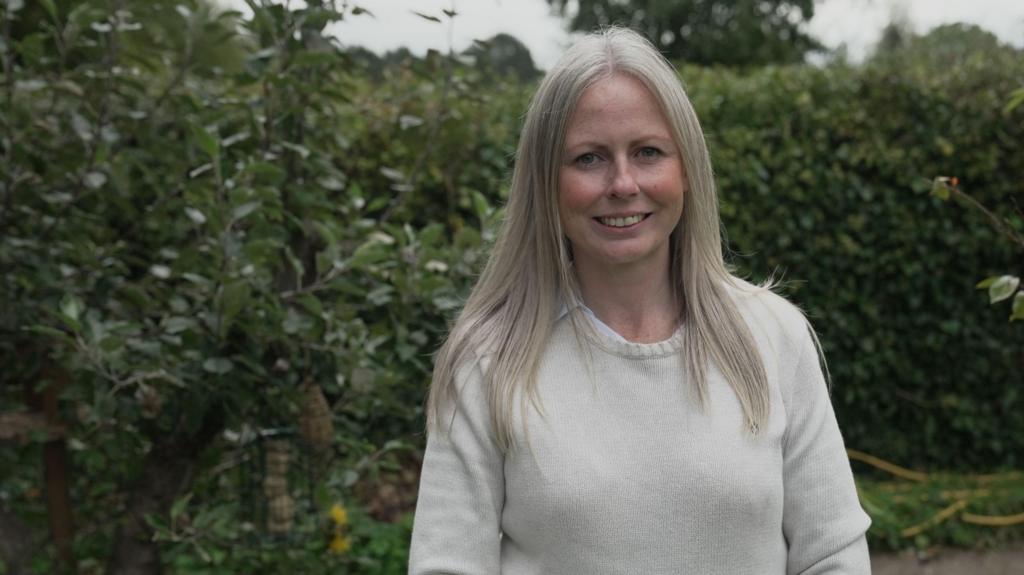“`html
For Emily Hough, nature was often perceived as something distant, a world separate from her own, merely a view from a hospital window.
Years spent in and out of specialist mental health units in Birmingham and London, receiving treatment for an eating disorder she had battled since the age of 12, left her feeling disconnected from the countryside and uninterested in the everyday flora and fauna around her.
That changed five years ago when a hospital occupational therapist offered an unconventional prescription: Grow a sunflower.
“I’ll be honest, I’d never planted anything in my life,” Ms. Hough stated.
“But planting that sunflower, watching it grow as I watered it and protected it from the shade, helped me feel connected for the first time. I was truly able to appreciate what was around me – and how I could make a difference to nature, and what nature could actually do for me.”
“I was in a hospital at that point, so it was very limited. Fast forward five years, and here we are today.”
From these humble beginnings, Ms. Hough, now 35, embraced what the NHS formally refers to as “green social prescribing”, a practice where GPs and healthcare professionals refer patients to organizations offering nature-based activities, ranging from hiking and birdwatching to rockpooling and tending to city allotments.
Designed to complement mainstream treatments and therapies, it has been a key component of the government’s 10-year plan for the NHS in England.
While the scheme may not be universally effective, for Ms. Hough, who has since relocated from Solihull to embrace a life in the countryside, the benefits have been profound.
Now out of hospital, she has become what the NHS terms an “Expert by Experience” (EbE) – someone who leverages their personal experiences to contribute to the design and evaluation of new health services.
She played a pivotal role in shaping the Royal Society for the Protection of Birds (RSPB)’s flagship “nature prescription” scheme for the West Midlands, which launched earlier this year.
On Friday – World Mental Health Day – the scheme celebrates the training of its 100th health professional, equipping them with resources to support 1,000 patients in accessing nature-based activities.
However, the future of green social prescribing remains uncertain.
Despite a four-year national pilot program, which concluded in March, being deemed a success by an independent evaluation of its initial two years, concerns persist that the responsibility for funding these initiatives is increasingly falling to charities.
Organizations, including The Wildlife Trusts, the RSPB, and the Ocean Conservation Trust, are urging the government to commit increased funding to nature prescription schemes and expand their implementation beyond the initial seven trial areas.
Dom Higgins, head of health and education for The Wildlife Trusts, emphasized: “It is unequivocal that nature improves mental health.”
“I think the time for questioning the evidence is really over, and people within the system, the NHS, and decision-makers understand this.”
“We simply need the mechanism to make it available everywhere. It’s time to seriously fund prevention and opportunities for people to create good health in the neighborhoods where they live and work.”
The national pilot scheme saw nearly 8,500 individuals prescribed nature activities in its first two years, with over half of these patients residing in socio-economically disadvantaged areas.
Chris Dayson, professor of voluntary action, health and wellbeing at Sheffield Hallam University and a member of the evaluation team, noted that the scheme resulted in “a really statistically significant increase in wellbeing” for patients.
The evaluation also revealed a positive economic social return, primarily through facilitating patients’ return to work, amounting to £2.42 for every £1 invested.
When contacted by the BBC, the government refrained from commenting on the future of green social prescribing but indicated that the evaluation of the trial scheme’s second two years would be published “in due course.”
While green social prescribing is intended to complement, not replace, conventional medical treatments and therapies, some express concern that it may not adequately address the broader social determinants of mental health.
Rob Poole, professor of social psychiatry at the Centre for Mental Health and Society, stated that, while he is not opposed to green social prescribing, he considers it an “inadequate response to the social determinants of health, such as poor housing, poverty, and deterioration in social infrastructure.”
“These are not lifestyle choices. They cannot be addressed by time-limited interventions, no matter how much better green activity makes you feel in the short run,” he added.
However, Shannon Kang, an NHS health and wellbeing coach at the University Medical Practice in Birmingham recently trained in nature prescribing by the RSPB, reports observing “dramatic results” – with patients experiencing reduced anxiety and stress levels.
For Ms. Hough, reconnecting with the natural world has been transformative: “I was skeptical. For years, I had walked around not appreciating nature. But I genuinely believe that nature has really helped save me. It has given me hope.”
If you have been affected by any of the issues raised in this article help is available via the BBC’s Action Line page.
Unions say Robert Jenrick’s verdict on Handsworth was “dangerous” and he should lose the Tory whip.
Officers were called to an address in Walthamstow to reports of a man with a firearm.
Katie Turton wants young people to speak about their problems following the loss of her son Max.
It is estimated £1.2bn is needed to implement the 35 actions initially set out in 2021.
An inquest hears boarding school pupil Georgia Scarff had anxiety and was hit by a lorry.
“`

